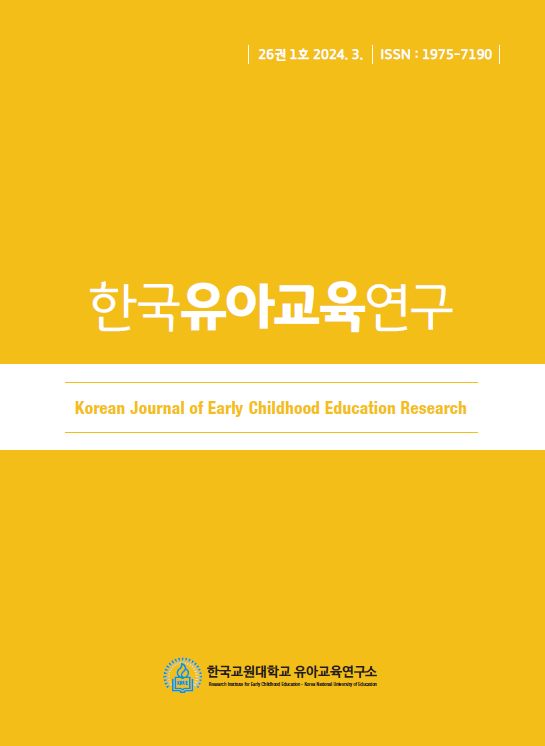경계선 유아에 대한 유아교사의 FGI 분석
Early childhood teachers' FGI analysis of borderline children
- 한국교원대학교 유아교육연구소
- 한국유아교육연구
- 제26권 제1호
-
2024.035 - 27 (23 pages)
-
DOI : 10.15409/riece.2024.26.1.1
- 96

본 연구는 유아교사의 경계선 유아에 대한 인식을 탐색해보는 데 그 목적이 있다. 이를 위하여 현재 유아교육기관에 근무 중인 유아교사 7인을 대상으로 어떤 유아를 경계선 유아로 인식하고,경계선 유아와의 관계에서 어려움은 무엇인지, 그리고 경계선 유아의 원만한 유치원 적응을 돕는 방안은 무엇이라고 생각하는지 FGI(포커스그룹 인터뷰)를 활용하여 분석하였다. 연구결과 첫째, 경계선 유아에 대한 함의로 유아교사는 ‘참을 수 없는 애매모호한 유아’, ‘소통이 전혀 되지 않는 유아’, ‘사회적 관계 맺기가 어려운 유아’를 경계선 유아로 생각하였다. 둘째 경계선 유아에 대한 필요조건은 교사의 포기하지 않는 마음 ‘보호자와의 소통과 협력’, ‘유치원 내부 및 외부의 지원 체계’로 나타났다. 본 연구의 결과는 유치원 현장에서 교사들이 경계선 유아를 지도하는 과정에서 경험하는 의미를 이해하여 유아의 유치원 적응 지원 방안 모색을 위한 기초자료로 활용될 수 있을 것이다.
The purpose of this study is to explore early childhood teachers' perceptions of borderline infants. To this end, seven early childhood teachers currently working at early childhood education institutions were analyzed using FGI (Focus Group Interview) to identify which infants are recognized as borderline infants, what difficulties they have in their relationship with borderline infants, and what they think are the ways to help borderline infants adjust to kindergarten smoothly. As a result of the study, first, as implications for borderline infants, early childhood teachers considered ‘unbearable ambiguous infants’, ‘infants who cannot communicate at all’, and ‘infants who have difficulty establishing social relationships’ as borderline infants. Second, the necessary conditions for borderline infants were ‘the teacher's ungiving mind’, ‘communication and cooperation with guardians’, and ‘support systems inside and outside kindergartens’. The results of this study can be used as basic data to find ways to support young children's adaptation to kindergarten by understanding the meaning teachers experience in the process of guiding borderline infants in the kindergarten field.
Ⅰ. 서론
Ⅱ. 연구 방법
Ⅲ. 연구 결과
Ⅳ. 논의 및 결론
참고문헌
(0)
(0)